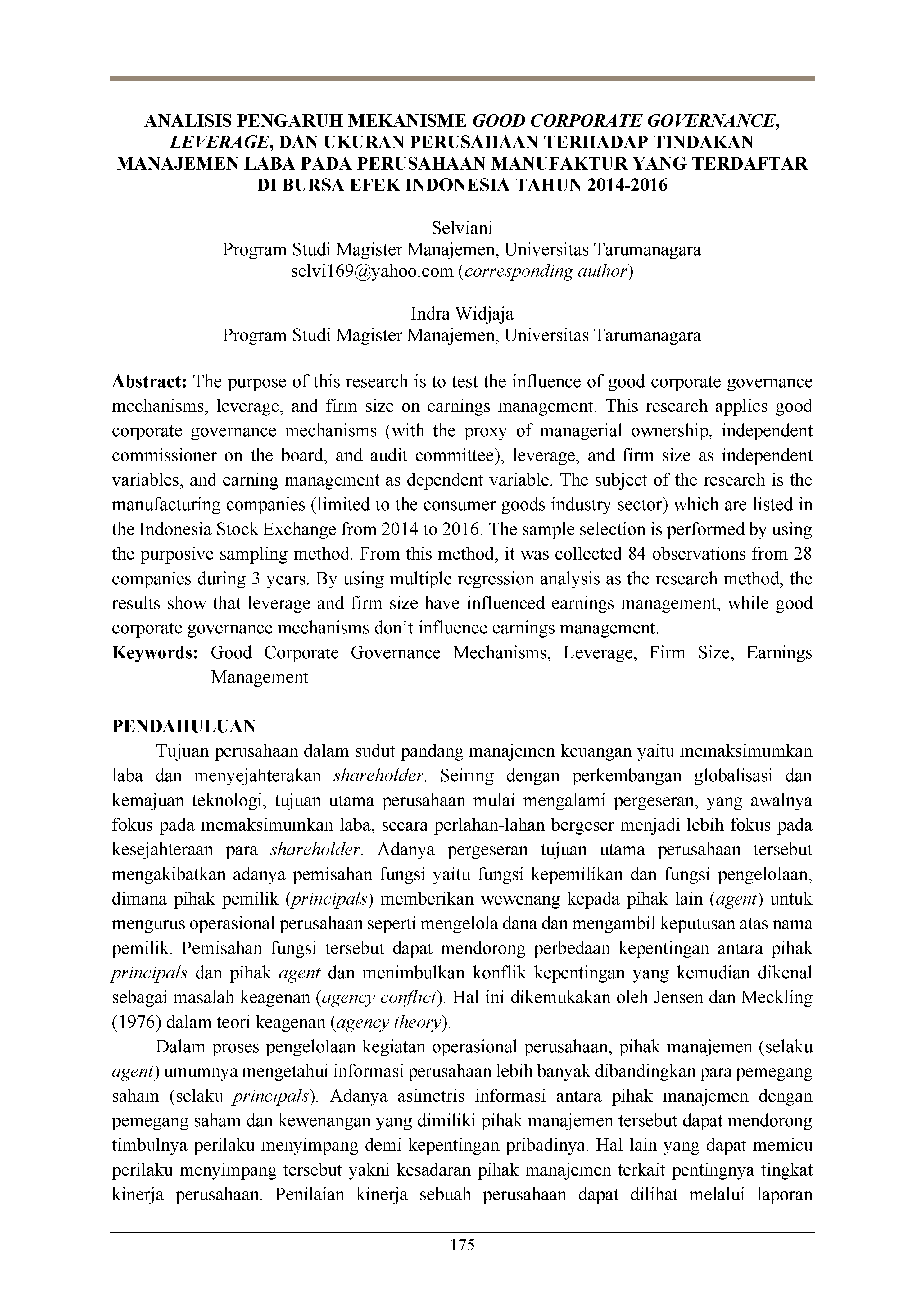Analisis pengaruh mekanisme good corporate governance, leverage, dan ukuran perusahaan terhadap tindakan manajemen laba pada perusahaan manufaktur yang terdaftar di Bursa Efek Indonesia tahun 2014-2016
Main Article Content
Abstract
The purpose of this research is to test the influence of good corporate governance mechanisms, leverage, and firm size on earnings management. This research applies good corporate governance mechanisms (with the proxy of managerial ownership, independent commissioner on the board, and audit committee), leverage, and firm size as independent variables, and earning management as dependent variable. The subject of the research is the manufacturing companies (limited to the consumer goods industry sector) which are listed in the Indonesia Stock Exchange from 2014 to 2016. The sample selection is performed by using the purposive sampling method. From this method, it was collected 84 observations from 28 companies during 3 years. By using multiple regression analysis as the research method, the results show that leverage and firm size have influenced earnings management, while good corporate governance mechanisms don’t influence earnings management.
Article Details
Section

This work is licensed under a Creative Commons Attribution-NonCommercial-ShareAlike 4.0 International License.
This work is licensed under a Jurnal Manajemen Bisnis dan Kewirausahaan Creative Commons Attribution-ShareAlike 4.0 International License.
How to Cite
References
Amelia, W., & Hernawati, E. (2016). Pengaruh komisaris independen, ukuran perusahaan, dan profitabilitas terhadap manajemen laba. Neo-Bis, 10(1), 62–77. https://doi.org/10.21107/nbs.v10i1.1584
Astami, E. W., Hartadi, B., & Tower, G. (2006). Factors explaining management preferences of accounting for goodwill prior to the implementation of IFRS 3: A cross-country study. Gadjah Mada International Journal of Business, 8(1), 43–67. https://doi.org/10.22146/gamaijb.5624
Asward, I., & Lina. (2015). Pengaruh mekanisme corporate governance terhadap manajemen laba dengan pendekatan conditional revenue model. Jurnal Manajemen Teknologi, 14(1), 15–34. https://doi.org/10.12695/jmt.2015.14.1.2
Dechow, P. M., Sloan, R. G., & Sweeney, A. P. (1995). Detecting earnings management. The Accounting Review, 70(2), 193–225. https://www.jstor.org/stable/248303
Dhaliwal, D. S., Li, O. Z., Tsang, A., & Yang, Y. G. (2010). Voluntary nonfinancial disclosure and the cost of equity capital: The initiation of corporate social responsibility reporting. The Accounting Review, 86(1), 59–100. https://doi.org/10.2139/ssrn.1687155
Gumanti, T. A. (2000). Earnings management: Suatu telaah pustaka. Jurnal Akuntansi dan Keuangan, 2(2), 104–115. https://doi.org/10.9744/jak.2.2.pp.%20104-115
Hanggara, K. (2016). Pengaruh corporate governance terhadap manajemen laba (Studi empiris pada perusahaan manufaktur yang terdaftar di Bursa Efek Indonesia pada tahun 2010-2012) [Thesis]. Universitas Tarumanagara.
Harahap, S. S. (2015). Teori akuntansi (Revisi). Rajawali Pers.
Hery. (2014). Teori akuntansi positif: Rekayasa dan perataan laba. Jurnal Ilmiah Nasional, 11(2), 285–296.
Isnanta, R. (2008). Pengaruh corporate governance dan struktur kepemilikan terhadap manajemen laba dan kinerja keuangan [Skripsi]. Universitas Riau.
Jensen, M. C., & Meckling, W. H. (1976). Theory of the firm: Managerial behavior, agency costs and ownership structure. Journal of Financial Economics, 3(4), 305–360. https://doi.org/10.1016/0304-405X(76)90026-X
Larastomo, J., Perdana, H. D., Triatmoko, H., & Sudaryono, E. A. (2016). Pengaruh tata kelola perusahaan dan penghindaran pajak terhadap manajemen laba pada perusahaan manufaktur di Indonesia. Esensi: Jurnal Bisnis dan Manajemen, 6(1), 63–74. https://doi.org/10.15408/ess.v6i1.3121
Mahawyahrti, T., & Budiasih, G. N. (2016). Asimetri informasi, leverage, dan ukuran perusahaan pada manajemen laba. Jurnal Ilmiah Akuntansi dan Bisnis, 11(2), 100–110. https://doi.org/10.24843/jiab.2016.v11.i02.p05
Mahiswari, R., & Nugroho, P. I. (2014). Pengaruh mekanisme corporate governance, ukuran perusahaan dan leverage terhadap manajemen laba dan kinerja keuangan. Jurnal Ekonomi dan Bisnis, 17(1), 1–20. https://doi.org/10.24914/jeb.v17i1.237
Nanok S., Y., Natasya, & Widadi, B. A. (2010). Faktor-faktor yang mempengaruhi manajemen laba perusahaan publik di Indonesia pada tahun 2008. Journal of Applied Finance & Accounting, 3(1), 60–74. https://doi.org/10.21512/jafa.v3i1.163
Sari, S. R., & Asyik, N. F. (2013). Pengaruh leverage dan mekanisme good corporate governance terhadap manajemen laba. Jurnal Ilmu & Riset Akuntansi, 2(6), 1–21.
Scott, W. R. (1997). Financial accounting theory. Prentice-Hall.
Sriwedari, T. (2009). Mekanisme good corporate governance, manajemen laba dan kinerja keuangan perusahaan manufaktur di Bursa Efek Indonesia [Thesis, Universitas Sumatera Utara]. https://repositori.usu.ac.id/handle/123456789/44394
Stice, E. K., Stice, J. D., & Skousen, K. F. (2009). Intermediate accounting (Akuntansi intermediate) (B. Nicodemus (ed.); A. Akbar (trans.); 16th ed.). Salemba Empat.
Watts, R. L., & Zimmerman, J. L. (1978). Towards a positive theory of the determination of accounting standards. The Accounting Review, 53(1), 112–134. https://www.jstor.org/stable/245729


